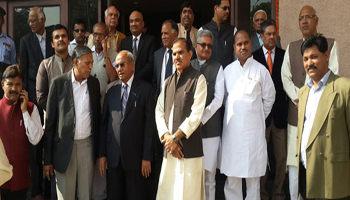The year 2014 ended well for the cooperative sector in India. With the change of the guard at the Centre a renewed zeal was noticeable among cooperators. Though cooperatives are supposed to be politically neutral, those leaning right turned enthusiastic and those close to the UPA fold either looked crestfallen or began bending over backwards to join the rightist bandwagon.
Govt means change and more so if it is a Modi govt. The govt has tried to make bureaucracy tune in with the time with accountability as its mantra. It has upturned many an acts of the UPA. Land Acquisition bill is the latest case in point.
Traditionally, the leadership of cooperatives rests in the hands of the government of the day and the present government is no exception. The aggressiveness of the government nominee Ashok Thakur at the time of the NAFED election is well known. Many more such cases are sure to crop up in the next days. A hint of things to come was given by the Union Cooperation Minister Radha Mohan Singh during the Valedictory function of Cooperative Week in NCUI recently.
The taste of new regime’s aggressiveness could also be felt in the coming elections such as NCCF election in February, Kribhco’s in January only and election in the apex cooperative body NCUI before March when the term of present board is ending.
Coming back to the health of the cooperative movement per se as it stands today, there is not much to make us cheer up. The much-touted 97th Constitutional Amendment stands blocked by the Gujarat High Court and is pending before the Supreme Court. States after states are trying to delay cooperative elections. And if they do hold the elections, it is rigged in majority of cases as seen in the Bihar Primary Agricultural Cooperative Societies elections.
Odisha has tried its best to delay it while the new govt in Maharashtra has green-lighted the housing cooperative elections in the state.
NCUI, the apex national cooperative body is crying for crumbs of both fundand staff while state cooperative unions, without the fund as well as the will, are poor agents for igniting the cooperative movement. .
However, some individual cooperative institutions have done remarkably well defying the trend. If IFFCO could send its member to the ICA board, Amul has ensured that across the seven seas people taste what is known as the Taste of India.
But overall, the movement does not hold out hope. Touted as a model capable of replacing the existing business models in the country, the goal is yet a far cry. Meanwhile, cases of corruption that keep piling up prejudice the government and the common men alike. If we wish to take this movement to its logical conclusion, we need to be above board. Only an honest voice could fearlessly be spoken. Jai sahakar!
